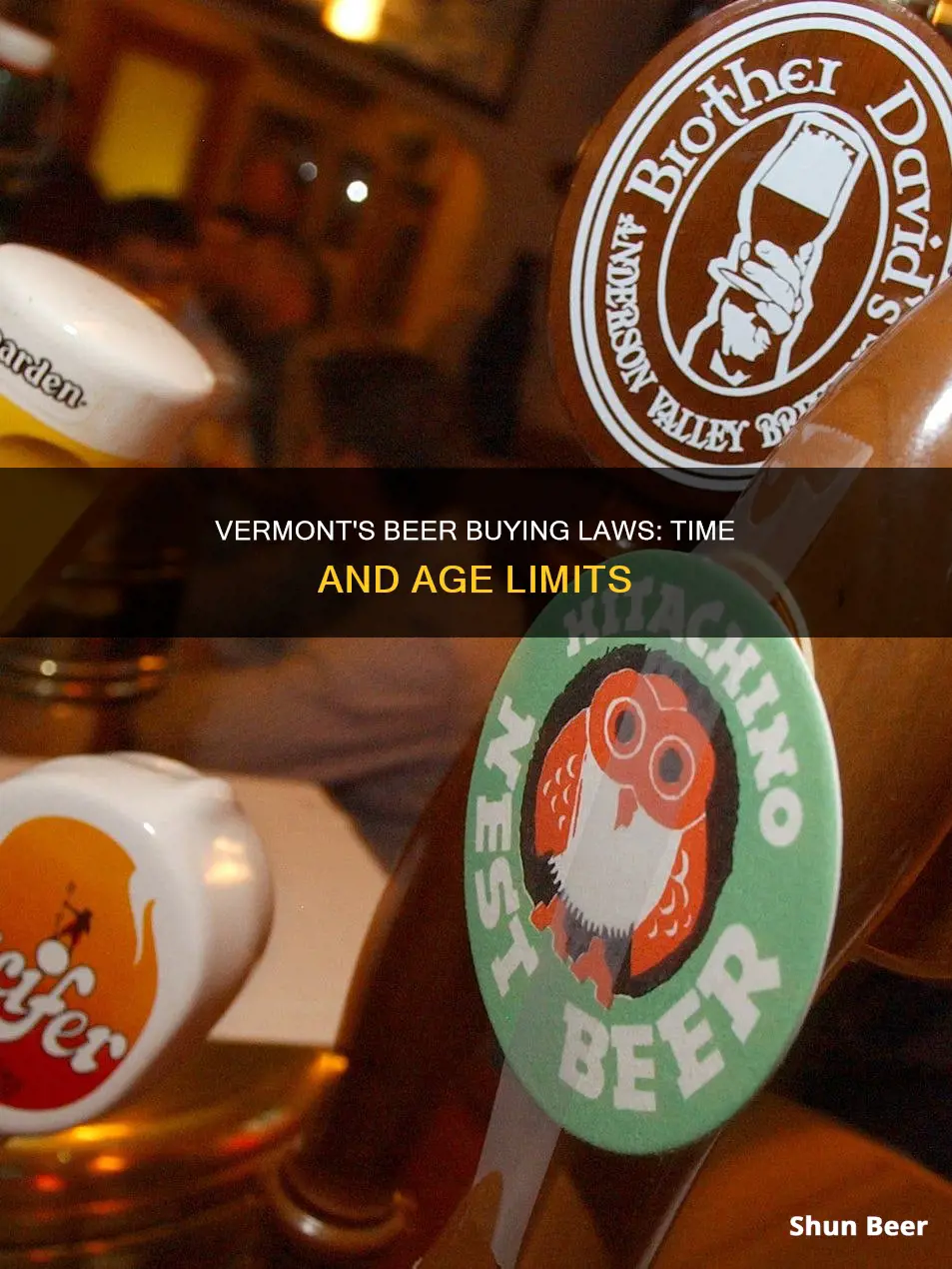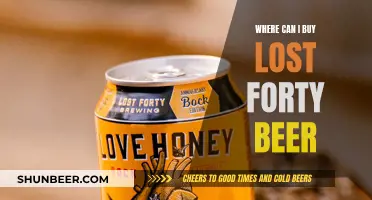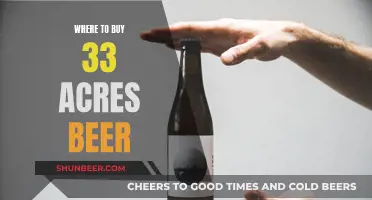
In Vermont, you can buy beer any day of the week. On-premise retailers such as bars and restaurants can sell alcohol between 8 am and 2 am, while off-premise retailers like grocery stores can sell between 6 am and midnight. The state's alcohol laws are not overly restrictive, and there are no extra restrictions on Sundays or holidays. Vermont is not a dry state, and alcohol delivery is permitted.
| Characteristics | Values |
|---|---|
| Days of the week beer can be bought | Monday to Sunday |
| On-premise retailers' selling hours | 8 am to 2 am |
| Off-premise retailers' selling hours | 6 am to midnight |
| Minimum drinking age | 21 |
| Minimum age to serve alcohol | 18 |
| Minimum age to work in a liquor store | 16 |
| Open container law | Alcohol must be in the trunk of the car |
| BAC limit for drivers under 21 | 0.02% |
| BAC limit for drivers 21 and older | 0.08% |
What You'll Learn

On-premise retailers can sell beer between 8 am and 2 am
Vermont's alcohol laws can be quite confusing, but it's important to understand them to avoid any legal trouble. Here's a detailed overview of the regulations surrounding on-premise alcohol sales in the state:
On-Premise Alcohol Sales in Vermont:
On-premise retailers in Vermont, such as bars and restaurants, are permitted to sell beer between the hours of 8 am and 2 am. This timeframe applies every day of the week, including weekends and holidays. This means that you can enjoy a beer with your breakfast, lunch, or dinner at any on-premise retailer during these hours.
Off-Premise Alcohol Sales:
It's important to distinguish between on-premise and off-premise sales. While on-premise retailers can sell beer from 8 am to 2 am, off-premise retailers have slightly different hours. Off-premise retailers include grocery stores, convenience stores, and liquor stores. These establishments are allowed to sell alcohol between 6 am and midnight. So, if you're looking to stock up on beer or other alcoholic beverages to enjoy at home, make sure to visit these stores within this timeframe.
Vermont's Alcohol Laws:
Vermont has a unique arrangement for alcohol sales, contracting private retailers instead of operating state-owned stores. The state also allows alcohol sales seven days a week, which is convenient for residents and visitors alike. However, it's important to note that there are dry towns within Vermont where alcohol sales are prohibited. Additionally, Vermont has strict regulations surrounding alcohol consumption, such as open container laws and laws against drinking and driving.
Age Restrictions:
It's important to remember that you must be 21 years of age or older to consume alcohol in Vermont. The state has strict laws against underage drinking and serving alcohol to minors. Additionally, while you can serve alcohol in a restaurant or bar at the age of 18, working in a liquor store requires individuals to be at least 16 years old.
Understanding Alcohol Laws:
Vermont's alcohol laws may seem complex, but understanding them is crucial to ensure compliance and safety. These laws are in place to regulate the sale and consumption of alcohol, protecting the public and promoting responsible drinking. As a consumer, it's your responsibility to abide by these laws, and businesses must also adhere to them to maintain their licenses and avoid legal consequences.
Buying Beer Late Night: Understanding the 2 AM Rule
You may want to see also

Off-premise retailers can sell beer between 6 am and midnight
Vermont's alcohol laws can be quite confusing, especially when it comes to the different rules for on-premise and off-premise retailers. So let's focus on off-premise retailers and the rules that apply to them.
Off-premise retailers in Vermont can sell beer between 6 am and midnight. This includes retailers such as grocery stores, convenience stores, and liquor stores. These retailers are allowed to sell beer and other alcoholic beverages for off-premise consumption only. This means that the alcohol must be purchased and taken out of the store to be consumed elsewhere. It is important to note that these hours may vary slightly in different counties or jurisdictions within Vermont, so it is always a good idea to check the local laws for the specific area you are in.
For those looking to purchase alcohol from an off-premise retailer in Vermont, it is important to plan your purchase between the hours of 6 am and midnight. This gives you a wide window of time to make your purchase, but it is still important to be mindful of the closing time to avoid any inconvenience. Additionally, keep in mind that the sale of alcohol is prohibited in four dry towns in Vermont, so if you are in one of those towns, you will not be able to purchase alcohol from any retailer.
The rules for off-premise retailers in Vermont are designed to regulate the sale of alcohol and ensure that it is only sold during specific hours. This helps to promote responsible drinking and gives retailers a clear framework to follow. It is important for retailers to comply with these regulations to avoid any legal issues and maintain their licenses to sell alcohol.
In summary, if you are looking to purchase beer from an off-premise retailer in Vermont, you can do so between the hours of 6 am and midnight. Make sure to check the local laws for your specific area and be mindful of the four dry towns in the state where alcohol sales are prohibited. By following these guidelines, you can ensure that you are complying with Vermont's alcohol regulations.
Best Places to Buy Atlantic Brewing Company Beer
You may want to see also

Vermont is not a dry state
In the context of alcohol, a dry state is one that prohibits or highly restricts the sale or production of alcohol. While Vermont has some of the strictest alcohol regulations in the country, it does not fall into this category. The state's restrictions are light enough that they are not considered to make it a dry state.
Vermont has a unique arrangement for the sale of alcohol. The state contracts with private retailers to sell alcohol rather than operating state stores. Beer and lower-alcohol wines are usually available in convenience and grocery stores. Retail stores can sell alcohol from 6 am to midnight, while bars and restaurants may serve from 8 am to 2 am.
Vermont has an open container law, meaning that no previously opened bottles of alcohol may be transported in the main compartment of a vehicle. They must be in the trunk. The state also has laws around drunk driving, with a blood-alcohol content (BAC) of over 0.08% considered 'intoxicated', and harsh penalties for those caught driving under the influence.
Vermont is a control state, meaning the state controls the distribution of liquor. While Vermont used to run liquor stores, it has since stepped back from this.
Last-Minute Beer Run: Christmas Eve Shopping
You may want to see also

Vermont has no dry counties, but four dry towns
- Athens (Windham County)
- Baltimore (Windsor County)
- Holland (Orleans County)
- Maidstone (Essex County)
The list of dry towns in Vermont used to include Weybridge, but it abandoned its prohibitionist stance in the last five years. The four remaining towns are home to less than 1,500 people, with Holland being the largest.
Vermont's laws on alcohol are not particularly strict compared to other states. In the areas where you can buy beer, you can do so seven days a week, from 8 am to 2 am in bars and restaurants, and from 6 am to midnight in grocery stores. There are no extra restrictions on Sundays, and bars close at 2 am.
Vermont's history with alcohol has been a tumultuous one. In the early 1800s, Vermont, like the rest of the young nation, was awash in alcohol. Drinking had serious social ramifications, and a state legislative committee in 1817 found that in some towns, people spent more on liquor than on schools and all other public expenses combined.
In response, social reformers created a temperance movement to combat the evils of drink. The movement tried moral suasion to get drinkers to quit, and when that failed, they turned to changing the laws. In 1844, lawmakers banned the selling of alcohol in all Vermont communities but left a massive loophole: communities could opt out of the statewide ban if voters decided to approve the granting of local liquor licenses.
In 1850, lawmakers scrapped the annual referendums on liquor and voted to make the entire state "dry", but left in exceptions for things like small beer and cider. Two years later, the Legislature decided to make the state even drier, banning the sale or production of all alcohol, though leaving exemptions for medicinal purposes and communion wine.
The state was divided geographically on the issue, with the strongest support for prohibition coming from the west side of Vermont, while all of the eastern counties, except Caledonia, opposed it. In general, large towns favoured prohibition, while small ones resisted it.
Nationwide Prohibition took the power to decide the issue away from the states, and it was repealed in 1933 with the passage of the 21st Amendment. But local-option remains alive in Vermont today, and communities still have the right to vote at town meetings to be dry or wet.
Buying Beer Bongs: Age Requirements and Legalities Explained
You may want to see also

The minimum drinking age in Vermont is 21
Vermont's drinking laws are fairly straightforward and not particularly strict compared to other states. The state's goal is to protect the general public and discourage dangerous behaviour involving alcohol. For example, it is illegal for a driver or passenger of a motor vehicle to possess an open container of alcohol. The container must be placed in the trunk, a locked glove box, or behind the rearmost upright seat if there is no trunk.
Vermont is not a dry state, meaning it does not prohibit the production or sale of alcohol. Alcohol can be purchased 7 days a week, although there are specific times during which alcohol sales are prohibited. On-premise retailers such as bars and restaurants can sell alcohol between 8 am and 2 am, while off-premise retailers like grocery stores can sell between 6 am and midnight.
Vermont also has some unique alcohol regulations. For example, the state contracts with private retailers to sell alcohol, rather than operating state-owned stores. Additionally, there are no extra restrictions on alcohol sales on Sundays, and businesses are not legally required to close on Sundays.
Traveler Beer: Where to Buy and Enjoy It
You may want to see also
Frequently asked questions
In Vermont, you can buy beer from 6 am to 2 am from off-premise retailers like grocery stores, and from 8 am to 2 am from on-premise retailers like bars and restaurants. These hours apply every day of the week, including Sundays.
Yes, there are 4 dry towns in Vermont where you cannot buy beer.
Vermont has an open container law, which means that open bottles of alcohol must be transported in the trunk of a vehicle, not in the main compartment. Additionally, the minimum drinking age in Vermont is 21, and minors may not drink alcohol with their parents.
Yes, alcohol delivery is legal in Vermont. However, there are specific rules that govern alcohol delivery, such as the requirement that deliveries must be made by the licensee or their employees.







